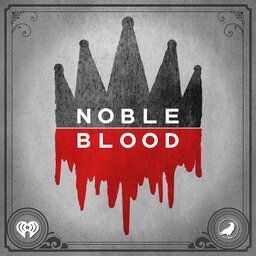“No one else in the world but her!”
Prince Wilhelm of Prussia had fallen in love with Elisa von Radzwill, and wanted to marry her. Unfortunately, even though she was a princess, her rank was low enough that the marriage would actually be illegal. Still, the two clung to the hope they would end up together, fighting royals and bureacrats for years to try to make it happen.
Support Noble Blood:
— Bonus episodes, stickers, and scripts on Patreon
— Noble Blood merch
— Order Dana's book, 'Anatomy: A Love Story' and its sequel 'Immortality: A Love Story'
In 1 playlist(s)
Noble Blood
Author Dana Schwartz explores the stories of some of history’s most fascinating royals: the tyrants …Social links
Follow podcast
Recent clips

The Missing Diamond in Case XIII
19:59

Antoine Lavoisier's Head
36:58

Cruelty and Murder, War and Peace
26:00
 Noble Blood
Noble Blood